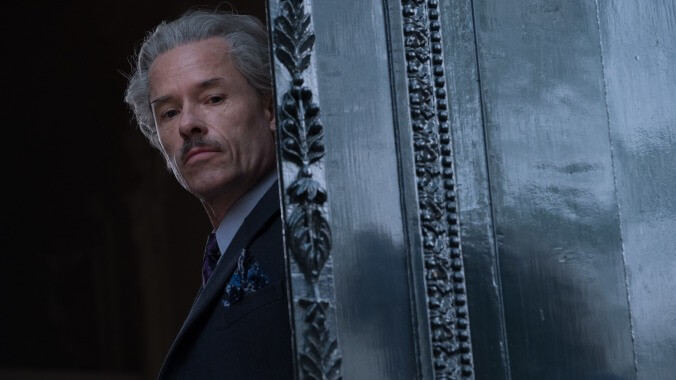The Last Vermeer tells an irresistible true story… after a lot of useless misdirection

Note: The writer of this review watched The Last Vermeer from home. Before making the decision to see it—or any other film—in a movie theater, please consider the health risks involved. Here’s an interview on the matter with scientific experts.
Han van Meegeren led a life fascinating enough to have served as the basis for a movie long before now. He also deserved to be said film’s focus, rather than a supporting character in his own bizarre story. For some reason, though, The Last Vermeer (which played the festival circuit last fall as Lyrebird) opts to invent a protagonist, Captain Joseph Piller (Claes Bang, in his second consecutive art film about the art world), whose banal personal life it struggles in vain to make remotely interesting. Shortly after World War II, Piller is on hand when a Vermeer painting, Christ And The Adulteress, gets recovered from the Nazis. It had been sold to none other than Hermann Göring, and Pillar traces its provenance back to Van Meegeren (Guy Pearce), who’s arrested for having collaborated with the enemy—a crime punishable by death. As it turns out, however, Van Meegeren has a novel defense for his action, which transforms him from pariah to national hero overnight. It’s a remarkable tale, and The Last Vermeer takes for fucking ever to get to it.
To some extent, that’s because first-time director Dan Friedkin, working from a screenplay credited in part to a couple of the guys who wrote Iron Man, treats Van Meegeren’s claim to fame as if it’s a secret, dramatically revealing it halfway through the film. This approach forces The Last Vermeer to kill time by pretending to care about Piller’s strained relationship with his wife (Marie Bach Hansen), who probably slept with Nazis while assisting the Resistance, and his eventual romance with plucky assistant Minna (Vicky Krieps, squandered in a thankless role, as if Phantom Thread had never happened). Meanwhile, Van Meegeren comes across as a goofy distraction, notable primarily for ridiculous eyebrows that resemble the tips of Salvador Dalí’s mustache. The movie would have been far more compelling had it said at the outset (spoiler!): “Hey, this dude is the world’s greatest art forger.”
Hence the original title—lyrebirds are renowned for their astonishing vocal mimicry (not just of human speech, but of sounds like chainsaws and car alarms. Van Meegeren was similarly adept, and Christ And The Adulteress was one of many fake Vermeers that fooled not only Göring but numerous art critics, historians, and analysts. The Last Vermeer’s depiction of his criminal trial bears little resemblance to what happened in real life, and the ways in which it’s been altered (including a revelation that occurs after the verdict) play exactly like the sensationalized nonsense that they are. But the same was true of, say, Argo’s exciting climax, and much of this film’s second hour, set in the courtroom, is no less shamelessly enjoyable. Pearce finally gets to cut loose with some delectably mannered smugness as Van Meegeren explains how he took his revenge upon detractors by creating new masterpieces in the style of Old Masters (and inventing an ingenious method to fool scientific tests seeking to determine their true age). There’s even a hint of a fascinating theme, as Van Meegeren justifiably asks how a completely original painting (in its details, if not in its style) can instantly go from priceless to worthless without a single brushstroke having changed.
Sadly, The Last Vermeer doesn’t have time to tackle this question with the depth it demands. (For more on the subject, watch the superb documentary My Kid Could Paint That.) It’s too busy with Captain Piller, whom Bang never manages to make much more than a stolidly handsome impediment to the stuff that’s worth watching. Friedkin, a billionaire who recently turned his attention to movies—producing such films as The Square (also starring Bang) and The Mule— doesn’t demonstrate any particular formal talent: The film looks unmemorably professional, which is to say, appropriately funded. But his commercial instincts, which extend to having all of these Dutch and German characters speak English, are quite sound. There’s no reason why this couldn’t have been good hokey pseudo-historical fun along the lines of, say, The Imitation Game. (Let’s just ignore that some folks perceived that film as Oscar-worthy.) All it required was putting the exceptional character front and center throughout, rather than shrouding his gift in pointlessly vague mystery.